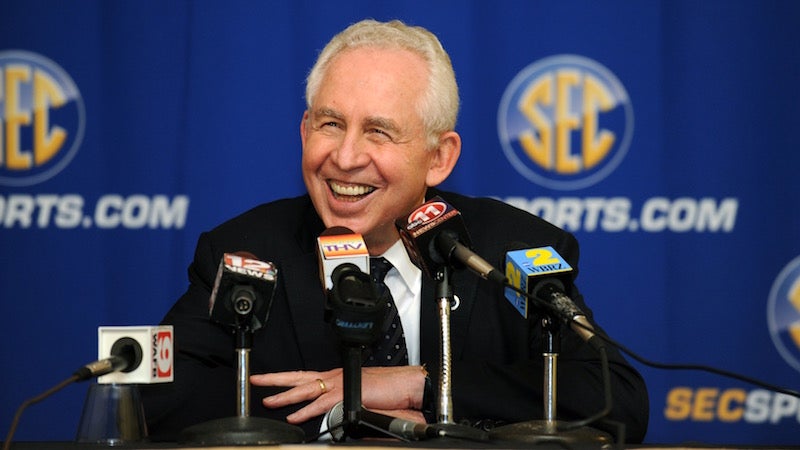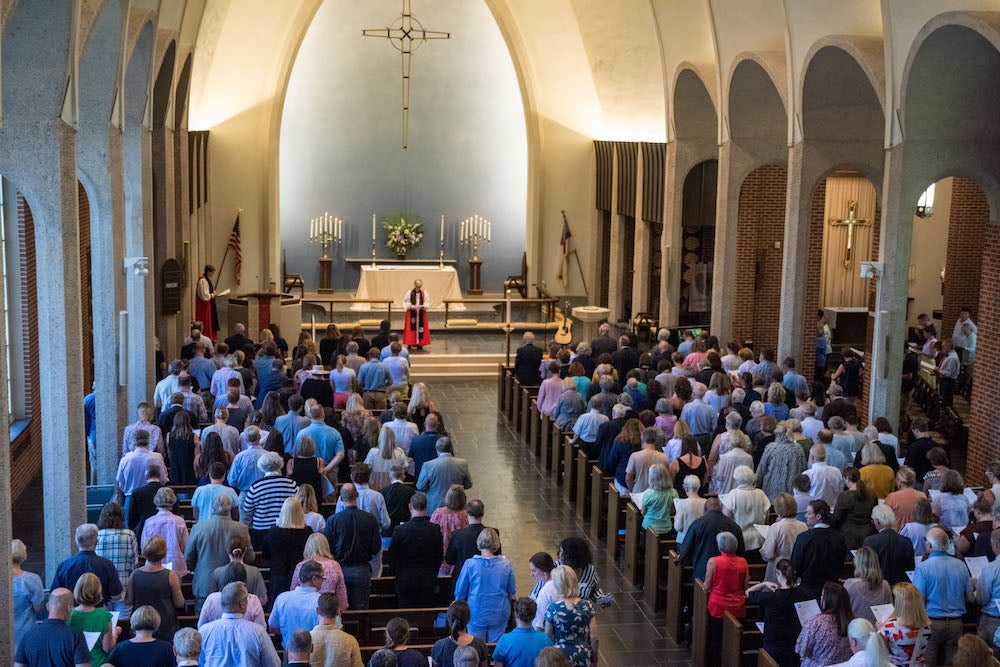By Madoline Markham
Photos by Blair Ramsey & Contributed
Mike Slive never forgot the day he first set foot on Panorama Drive. He and his wife, Liz, were moving to Vestavia Hills from downtown Chicago as he was starting a new position as Southeastern Conference commissioner in 2002, and that particular day the realtor walked them around the side of a house where Mike saw the crest view overlooking Birmingham’s foothills. He was sold right then, and then he turned around and said, “Great, it comes with a house too!”
Mike would quickly come to joke that they were northerners by birth and southerners by choice as they came to greatly enjoy the community around them, and he spent much of the years to come on the house’s screened-in porch taking in that view, smoking cigars, enjoying his morning coffee and conducting business on the phone.
When he retired from the SEC in 2015, Mike had an architect come designed an office space on the top floor of his Panorama Drive home to showcase memorabilia from his career. “He was a humble family guy and had never had a room like this before he retired, so it was his baby when he built this,” his daughter Anna Slive Harwood says. “He loved being up here.”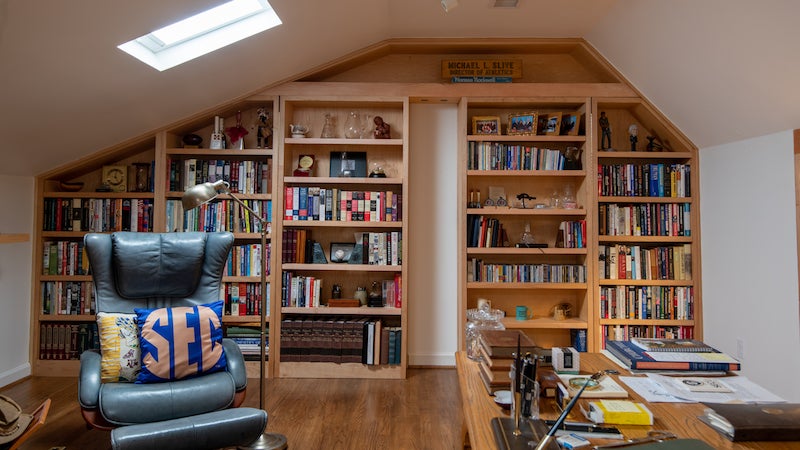
The wall of bookshelves on the far side of the room was home to countless books and photo albums as well as binders containing every speech he made for the SEC. Throughout you’d find items like a bobble head that was made of him and cowbells given to him by former Mississippi State Athletic Director Larry Templeton, also one of Mike’s best friends.
Mike, who passed away from complications of prostate cancer in 2018, loved history and filled his shelves with biographies of Winston Churchill and other leaders. “There are people who read books about leadership, and there’s a whole self-help section full of them. But my dad read biographies of great leaders,” Anna says. “I think that contributed to his leadership skills because he knew history and what great leadership is.”
Still his most prized possessions in the room weren’t the championship rings, commemorative watches or basketballs from each of the five years he served on the NCAA Men’s Basketball Selection Committee in the office. Instead they were the framed photos of his family that filled a shelf right next to the door to the room. “Family was everything to him,” Anna says.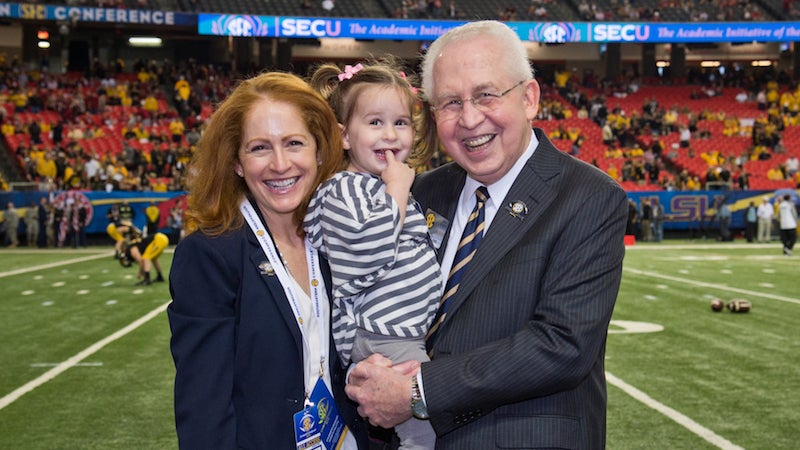
For Mike serving as commissioner of the SEC was the perfect culmination of all parts of his long career in sports and law. He’d worked as a lawyer and district court judge when he was younger and founded a law firm that assisted NCAA institutions in compliance matters. Before serving as conference commissioners, he was an assistant director of athletics at Dartmouth College, his alma mater, and the director of athletics at Cornell University. Those who knew him would say he was tough and fair and honest and kind, all at the same time, in all of those positions and as commissioner of the Great Midwest Conference or Conference USA before starting with the SEC.
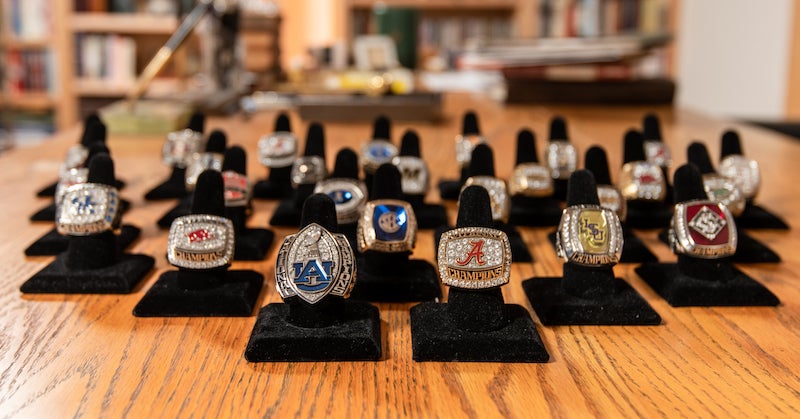
Mike’s extensive collection of rings, mostly from national championships that SEC institutions won, represent almost every institution in the conference.
“When he came to the SEC in 2002, a lot of SEC institutions at the time were dealing with infractions cases, and he came in with that judge/ lawyer/athletic background and was able to help guide them to establish some new rules,” Anna says. “He was really good at leading but also understanding the push pull of leadership. Sometimes you have push your agenda. Other times you have to let yourself be pulled by the situation and guide the best you can.”
One of his proudest moments as SEC commissioner was the hiring of Sylvester Croom, the first African American head football coach in the SEC, during his tenure, and starting the SEC’s Academic Consortium, the conference’s academic initiative.
And Mike did all of these things for 14 years coming into the role of commissioner at 62 years old, the age at which many people are enjoying a slower pace of life in retirement. “He used to joke that when he got the job he was 6 feet tall and shrunk after that,” Anna says. “I think he would say it was the most challenging and rewarding job of his career and a perfect culmination.”
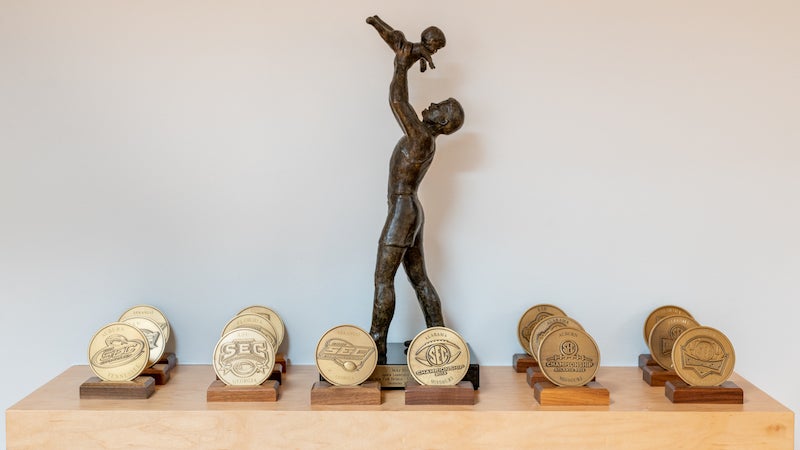
Mike was especially proud of a March of Dimes leadership award he received in New York City, which is surrounded by commemorative athletic coins here on a shelf in his office.
While his legacy in sports is certainly storied, for his family it’s just as much about his character as the list of accomplishments you can find with a quick Google search. (While he was at its helm, the SEC’s annual revenues increased from $96 million to $455.8 million, Missouri and Texas A&M joined the conference, and SEC schools won 81 national championships including seven consecutive national championships in football, just to name a few highlights.)
“He was unbelievable with names, and despite all that must have been going on in his head at any given time, he never forgot a name,” Anna says. “He would remember your wife’s name and ask about your children. When he died, I got hundreds of letters from all over the country. Very few people talked about his accomplishments. What they wrote about were stories of his kindness and what he did for them years ago. It was always about the people for him. He taught me the golden rule: Treat others as you wish to be treated regardless of what they can do for you. He treated a university president and a janitor at that institution with the same kindness and respect.”
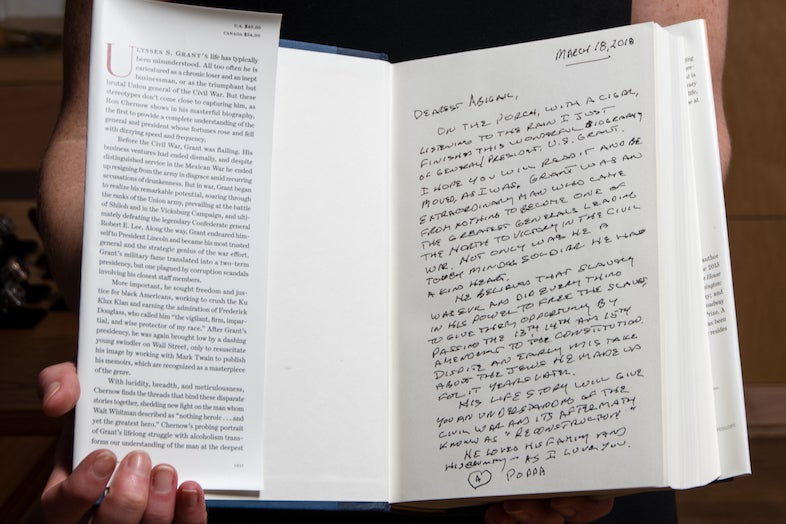
Mike would often write a note to his granddaughter Abigail in a book after completing it. “He wanted his library to become her library,” Anna says. “That is one of the best gifts he could give her.”
Another trait that stands out to Anna was his dad’s empathy in how he led. “He let everyone else speak first and really listened and then at the end would take what everyone said and then say something,” she says. “Imagine sitting in a room with 14 athletic directors or presidents who all have a different agenda for their own institution and bring them all together on an issue. That was what his skill was. In the end, it was a family. That’s what he always said, ‘I want this to be an SEC family.’”
Perhaps above all that’s the legacy that Mike’s office speaks to the most: his Slive family AND his SEC family.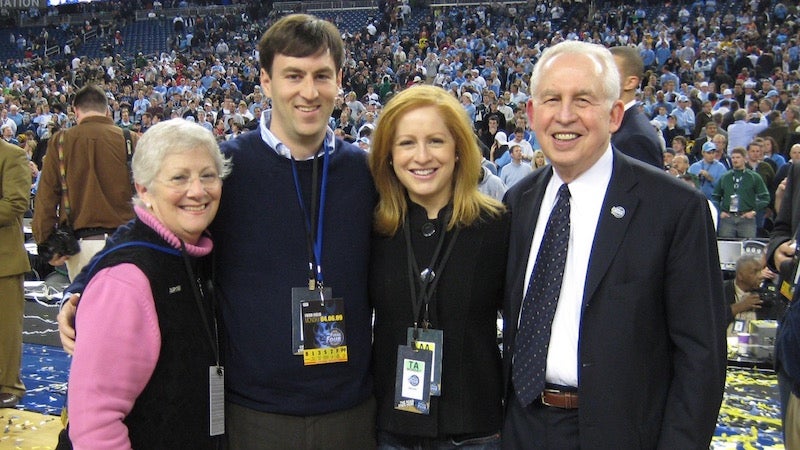
Another Mike Slive Legacy
The Mike Slive Foundation started with notes on napkin at Salem’s Diner, where a booth in Mike’s memory is now filled with his photos. Mike battled prostate cancer for 20 years before he passed away in 2018, 18 months after he co-founded the foundation with Ed Myerson. Ed’s father had prostate cancer, and Ed wanted to start the foundation so his grandsons don’t have to deal with it someday.
Today one in eight men will get prostate cancer in their lifetime, and if you are African American or if your dad or grandfather had it, you are twice as likely to get it. The good news is when the cancer is caught early, it’s 98 percent treatable, so much of what the foundation does is to get out the word about early detection—a message that many men are more likely to listen to if they hear it from an athletic leader.
Mike’s cancer eventually metastasized to his spine, and he went through surgery and chemo treatments. He said part of why he wanted to create the foundation is because he didn’t want any man to go through all that he went through, which could have been treated if it was diagnosed earlier. “He said to me early on that it’s amazing to think that his legacy could be something beyond just college sports with this foundation,” Anna says.
To learn more about the Mike Slive Foundation or to donate, visit mikeslivefoundation.org.
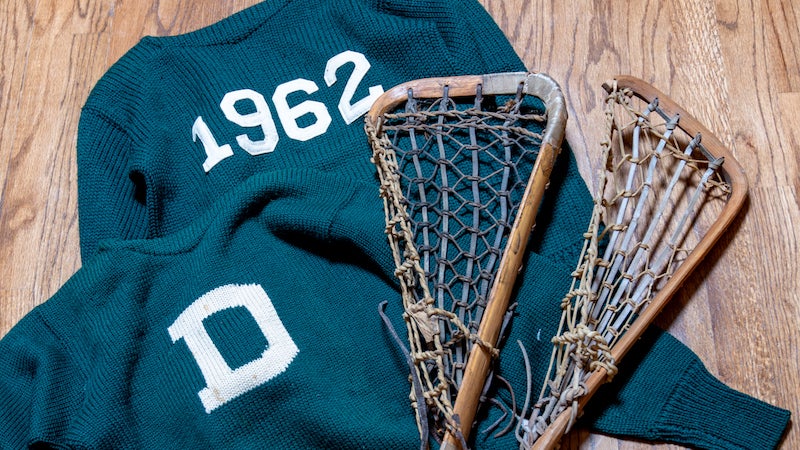
Mike played lacrosse at Dartmouth, and his family still has his letterman sweaters and his lacrosse sticks from those years of his life. “He was the first person in his college to complete four years of college, let alone go to law school and get a master of studies in law,” Anna notes. “Coming from Utica, New York, a blue collar working town, going to Dartmouth was a big deal. He always had those leadership skills in him, but he said Dartmouth really launched him into a different stratosphere for his life track.”
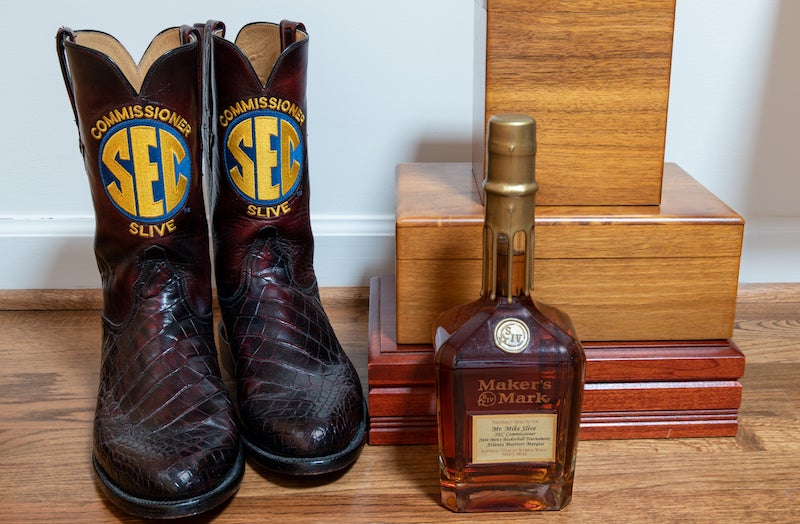
Texas A&M had cowboy boots custom made for Mike when the school joined the SEC Conference. Mike was also an avid cigar smoker and a fan of Maker’s Mark—which he and his family referred to as “the medicine” dating back to when Mike’s dad called that. “Any time I was struggling or having a bad day, he’d look at me and say, ‘Let’s go have a little medicine. We’ll talk it through,’” Anna recalls.

Mike was close friends with former UAB Athletic Director Gene Bartow and was commissioner of the Great Midwest Conference in 1991 when UAB joined that conference. This photo that hung in his office also shows former Vestavia Hills Mayor Scotty McCallum, who was president of UAB at the time.

